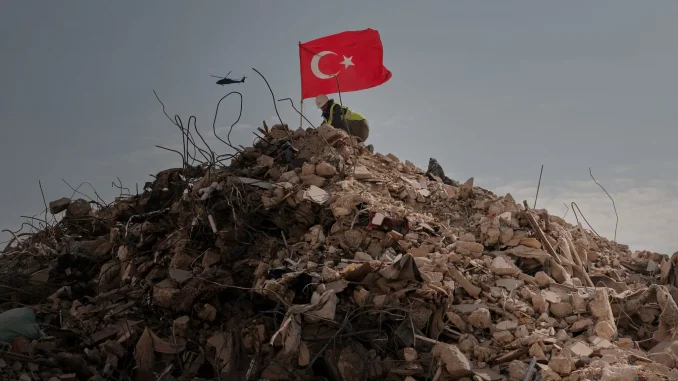
On Monday, Feb. 6, a devastating earthquake hit Turkey and Syria, leaving at least 34,000 people dead in its path. At a 7.8 magnitude, it was so powerful that it was felt in the neighboring areas of Israel, Lebanon and Cyprus. As this region is located on a major fault line, citizens aren’t strangers to earthquakes. However, they have not been hit with such a high intensity in over a decade. The earthquake’s epicenter was located in Gaziantep, Turkey and was followed by a daunting series of aftershocks, which worsened the damage.
Cities are in ruins, and many civilians have found themselves painfully trapped beneath the rubble in freezing cold temperatures. Rescue missions have been underway and are “approaching the end of the search and rescue window,” stated Belit Tasdemir, UN liaison officer at AKUT Search and Rescue Association.
The affected area is daunting and will take years to rebuild. “We’ve done a bit of mapping of the size of the affected area,” remarked Caroline Holt, Director of disasters, climate and crises at the International Federation of the Red Cross (IFRC). “It’s the size of France.”
Thousands of homes have collapsed as many of the structures built were susceptible to destruction. There have been many difficult rescues, including a baby that was saved from being underneath rubble for 108 hours.
Families are out searching for their loved ones in the piles of destroyed towns and cities. Some citizens are angered with the government and the actions taken following the disastrous incident. Authorities are detaining some contractors for their haphazard work on the buildings, which is thought to be a reason for the amount of mass destruction. According to the New York Times, “residents said that [building codes after 1999] were often not applied because contractors can earn more money when they cut corners: mixing the concrete and using cheaper metal bars to grid pillars, among other things.”
Turkish officials are beginning to set up “Earthquake Crimes Investigation Units” in efforts to detain any persons responsible for destruction. A plethora of arrests have thus taken place, which is the first step in identifying and punishing people that aided towards the deaths of fellow community members. Many of those detained were in the process of attempting to flee the country.
According to Bloomberg, Turkey’s President Recep Tayyip Erdoğan declared “a handout of 10,000 lira ($531) will be given to each family affected by the quakes.” In hopes of getting people to more comfortable conditions, this money is aiding to help by assisting families that have lost almost everything in this natural disaster.
In a country where the inflation rate passed 80 percent last year, citizens are weary about the government’s plans for reconstruction. As they are left in rubble with little to eat, the fate of people inhabiting those areas is uncertain. The city of Marash’s soccer stadium has been converted into an aid distribution center where families are taking shelter.
In Melbourne, Australia, dozens of volunteers are preparing supplies to be shipped to those in affected areas. The packages are anticipated to arrive quickly, as quick initiative was taken to provide assistance to those in need. “We did this for the bushfires in Australia back in 2019. We got the community together, and we’ve done it again,” stated Bea Tercan, a volunteer for the drive. “The Turkish community knows how to get together when there’s a crisis.”
“We’ve now entered into the humanitarian phase,” stated Jamie LeSueur, the head of emergency operations at the International Federation of Red Cross and Red Crescent Societies. “That is going to last for a couple of months, where we’ll still try to meet people’s basic needs.” Their efforts are attempting to get people back in homes and with enough resources to survive.
“We aim to rebuild homes in Kahramanmaras and nine other provinces within one year,” stated President Erdogan. “If anyone prefers not to stay in tents, we can transfer them to hotels in Alanya, Mersin and Antalya.”
Bloomberg Economics estimates that the public spending around the earthquake, which includes rebuilding efforts, can make up 5.5 percent of the gross domestic product. President Erdogan called for a three month state-of-emergency, which will allow him to take necessary precautions in a swift manner, anticipating he wins the upcoming election.
The World Health Organization (WHO) claims they are waiting for final approval to send crossline deliveries into northwest Syria. Their hesitation lies within the rebel groups that are claiming control in those territories. Director General Tedros Adhanom Ghebreyesus of WHO is anticipating travel to these areas and providing assistance. On his journey, he will be accompanied by over $290,000 worth of trauma emergency and surgical kits. Those involved are working tirelessly to negotiate access to these areas, as Syria already has a struggling healthcare system in place. According to CNN, “only 51 percent of medical facilities in government-held Syria were fully functional, with around 25 percent to 30 percent at partial capacity.”
In weeks prior to the earthquake, the Turkish government was spending billions of dollars in state funds to bolster President Erdogan and his governing party in the upcoming election. He expressed his intent to build Turkey’s economy, increase its influence abroad and protect the country from domestic and international threats if he were to win the election.
An anonymous Pakistani donor provided $30 million for earthquake relief, which was brought to the Turkish Embassy in the United States. The prime minister of Pakistan relayed his gratitude on Twitter, and remarked that he was “deeply moved” by this action.
Efforts to deliver supplies and support to affected areas are currently underway. At this time, aid has arrived in Turkey but attempts to enter Syria are still underway. The future of reconstructing the cities is uncertain, as no concrete plans have been announced.

